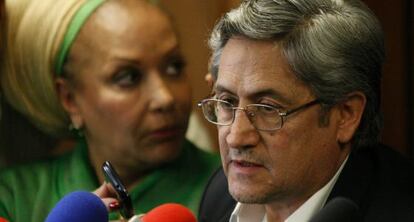Colombia announces peace talks with second-largest guerrilla movement
The National Liberation Army, with 1,500 members, is responsible for numerous kidnappings

The Colombian government has announced the beginning of peace talks with the country’s second-largest guerrilla movement, the National Liberation Army (ELN). In a joint statement published on the president’s official website on Tuesday, both parties said they had maintained “a series of interactions and meetings” since 2013. Dialogue was in “an exploratory phase,” the statement said, and the objective was “to agree on an agenda, design a process that will bring the conflict to an end, and create a solid and stable foundation for peace in Colombia.”
In a speech delivered from his presidential palace after the announcement, Juan Manuel Santos said his administration had decided to reveal the talks with the ELN “because the peace process with the FARC [Revolutionary Armed Forces of Colombia guerrillas] is in its final stage,” given that they had reached agreements on three of the five points on the agenda. For the president, the armed conflicts in Colombia are one single problem that involves two different guerrilla groups. “There cannot be two models for the end of the war,” he said. “We cannot endorse two different processes or two different methods to arrive at the truth.”
Until the exploratory phase is over, the government will not hold formal discussions with ELN, Santos said. And, when the time comes, formal negotiations will take place outside of Colombia “without a ceasefire on either side, while protecting every millimeter of our national territory and without demilitarization of any kind.”
At a time when the negotiations with the FARC, which began in November 2012, have become the main topic of the campaign for Sunday’s presidential election, ELN has decided to seek a similar path.
For President Santos, the armed conflicts are one single problem that involves two different guerrilla groups
According to the statement, the administration and the ELN have agreed to discuss “the victims and the participation of society” in the peace process. Negotiators at the FARC talks made a similar gesture towards Colombians in Havana, where representatives are insisting on placing the victims at the center of the conversation.
The government and the rebel army are addressing “Colombia and the international community” to express “their shared desire” to join each other at “the negotiating table” in a statement resembling the one published before talks with the FARC began. Both the government and the ELN also thanked Brazil, Chile, Cuba, Ecuador, Norway and Venezuela for “their good will and commitment” and for “accompanying and endorsing this process.”
ELN was founded at almost the same time as the FARC in July 1964. The organization believes in a blended Christian Marxist radical nationalist ideology. The group’s leaders say they have 1,500 members after attacks by the Colombian armed forces in 1995 and 2002 reduced their ranks by one-third.
This is not the first time ELN has begun dialogue with the Colombian government. The insurgents held talks with Santos’ predecessor Álvaro Uribe. As the 2000 peace process with the FARC floundered, ELN attempted to pressure the Colombian government into granting it a demilitarized zone, just as it had done for the country’s largest rebel army.
Last year, the ELN announced a series of kidnappings to get Santos’s attention after he began talks with the FARC
Last year, it tried to get the attention of the Santos administration a few months after the government began talks with the FARC by announcing a series of kidnappings – a practice that Colombians find particularly hateful.
It wanted to pressure the administration into starting a conversation. In early 2013, the rebel army freed two German nationals. Later that year, it released five contractors who worked for a multinational mining company. It also published a statement in which it emphasized its willingness to “hold talks with the state to reach non-military solutions.” In this week’s joint announcement, both parties said they hoped to bring “an end to the conflict and build a country of peace and equality.”
Since the beginning of negotiations with the FARC, various political and social groups have asked for open dialogue with ELN because they felt that peace would require a ceasefire from both insurgent armies.
Translation: Dyane Jean François
Tu suscripción se está usando en otro dispositivo
¿Quieres añadir otro usuario a tu suscripción?
Si continúas leyendo en este dispositivo, no se podrá leer en el otro.
FlechaTu suscripción se está usando en otro dispositivo y solo puedes acceder a EL PAÍS desde un dispositivo a la vez.
Si quieres compartir tu cuenta, cambia tu suscripción a la modalidad Premium, así podrás añadir otro usuario. Cada uno accederá con su propia cuenta de email, lo que os permitirá personalizar vuestra experiencia en EL PAÍS.
¿Tienes una suscripción de empresa? Accede aquí para contratar más cuentas.
En el caso de no saber quién está usando tu cuenta, te recomendamos cambiar tu contraseña aquí.
Si decides continuar compartiendo tu cuenta, este mensaje se mostrará en tu dispositivo y en el de la otra persona que está usando tu cuenta de forma indefinida, afectando a tu experiencia de lectura. Puedes consultar aquí los términos y condiciones de la suscripción digital.








































